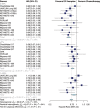The landscape of immune checkpoint inhibitor plus chemotherapy versus immunotherapy for advanced non-small-cell lung cancer: A systematic review and meta-analysis
- PMID: 31693178
- PMCID: PMC7028135
- DOI: 10.1002/jcp.29371
The landscape of immune checkpoint inhibitor plus chemotherapy versus immunotherapy for advanced non-small-cell lung cancer: A systematic review and meta-analysis
Abstract
Background: Lung cancer is the leading cause of cancer-related deaths worldwide and the prognosis remains poor. The recent introduction of the immune checkpoint inhibitor (ICI), or plus chemotherapy, both resulted in the survival benefit for patients with advanced non-small-cell lung cancer (NSCLC), but it remains unanswered which is superior. The current study aimed to estimate the comparative efficacy and safety of ICI-chemotherapy versus ICI-monotherapy in advanced NSCLC.
Methods: Studies were identified by searching PubMed, Embase, and Cochrane library. The randomized controlled trials (RCTs) that ICI monotherapy or ICI plus chemotherapy compared with chemotherapy in NSCLC were included with available primary endpoints of progression-free survival (PFS), overall survival (OS), objective response rate, or treatment-related adverse events. A fixed-effect or random-effects model was adopted depending on between-study heterogeneity.
Results: A total of 20 RCTs involving 12,025 patients with NSCLC were included. Both ICI-monotherapy and ICI-chemotherapy resulted in significantly prolonged survival compared to chemotherapy and the former led to significantly longer PFS. The magnitude of survival benefits appeared to be greatest among those treated with pembrolizumab plus platinum-based chemotherapy (OS, 0.56; PFS, 0.54). Additionally, OS and PFS advantages of ICI therapies were observed in patients with NSCLC with low or high programmed cell death 1 ligand 1 (PD-L1) expression level, but not in intermediate PD-L1 TPS.
Conclusions: Pembrolizumab plus platinum-based chemotherapy was recommended as the optimal first-line therapy for advanced patients with NSCLC. Additionally, PD-L1 alone is not recommended as an adequate molecular biomarker to identify eligible patients for routine clinical practice in immunotherapy.
Keywords: chemotherapy; efficacy; immune checkpoint inhibitor; non-small-cell lung cancer; safety.
© 2019 The Authors. Journal of Cellular Physiology published by Wiley Periodicals, Inc.
Conflict of interest statement
The authors declare that there are no conflict of interests.
Figures






References
-
- Anagnostou, V. , Smith, K. N. , Forde, P. M. , Niknafs, N. , Bhattacharya, R. , White, J. , … Velculescu, V. E. (2017). Evolution of neoantigen landscape during immune checkpoint blockade in non‐small cell lung cancer. Cancer Discovery, 7(3), 264–276. 10.1158/2159-8290.Cd-16-0828 - DOI - PMC - PubMed
-
- Barlesi, F. , Vansteenkiste, J. , Spigel, D. , Ishii, H. , Garassino, M. , de Marinis, F. , … Park, K. (2018). Avelumab versus docetaxel in patients with platinum‐treated advanced non‐small‐cell lung cancer (javelin lung 200): An open‐label, randomised, phase 3 study. The Lancet Oncology, 19(11), 1468–1479. 10.1016/S1470-2045(18)30673-9 - DOI - PubMed
-
- Borghaei, H. , David Hellmann, M. , Paz‐Ares, G. , Ramalingam, L., S. , Reck, M S. , John O'Byrne, K. , … Brahmer, J. (2018). Nivolumab (Nivo) + platinum‐doublet chemotherapy (Chemo) vs chemo as first‐line (1L) treatment (Tx) for advanced non‐small cell lung cancer (NSCLC) with <1% tumor PD‐L1 expression: Results from CheckMate 227. Journal of Clinical Oncology, 2018;36:9001.
Publication types
MeSH terms
Substances
LinkOut - more resources
Full Text Sources
Medical
Research Materials

